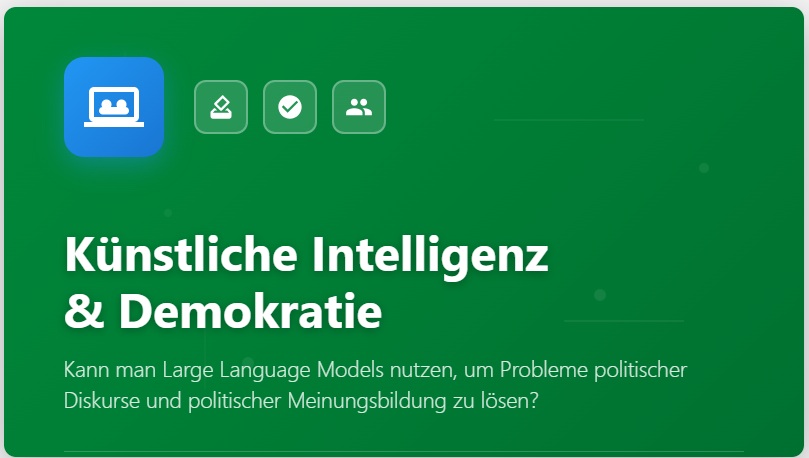Das Masterprojekt beschäftigt sich mit der Konzeptualisierung, Operationalisierung und empirischen Untersuchung des Konzepts Literacy in Zeiten von Künstlicher Intelligenz (KI). Im Wintersemester werden die zuvor konzeptualisierten und geplanten Forschungsprojekte empirisch durchgeführt und ausgewertet. Ziel ist die umfassende Darstellung des Forschungsprozesses in einem abschließenden Bericht.
- Trainer/in: Larissa Leonhard
- Trainer/in: Ruth Wendt

- Trainer/in: Diana Rieger
Computational journalism has been defined as the advanced application of computing, algorithms, and automation to the gathering, evaluation, composition, presentation, and distribution of news. Examples include the use of tools that automatically find and filter newsworthy information from social media platforms, the use of natural language generation to write news texts, and automated news personalization where stories are distributed to users according to their preferences. There have been few (if any) comprehensive and representative surveys of journalists on the topic of computational journalism. Amongst many other things, such a survey could find out, for example, how widespread the use of automated journalism is in newsrooms; to what extent journalists are worried that automated journalism could make them redundant; and what correlations, if any, exist between the two. In this project, you will design, pre-test, field, and analyse a survey of journalists on the subject. A database of the contact details of approximately 25,000 journalists (in the UK) will be made available for use in survey recruitment as will user accounts for the professional Qualtrics survey platform. The project's results have the potential to make a significant, original contribution to the understanding of how AI and automation are used in journalism and the consequences of that use. The project will be taught, conducted, and examined in English.
- Trainer/in: Sina Thäsler-Kordonouri
- Trainer/in: Neil Thurman

- Trainer/in: Lara Kobilke
- Trainer/in: Carsten Reinemann
Computational journalism has been defined as the advanced application of computing, algorithms, and automation to the gathering, evaluation, composition, presentation, and distribution of news. Examples include the use of tools that automatically find and filter newsworthy information from social media platforms, the use of natural language generation to write news texts, and automated news personalization where stories are distributed to users according to their preferences. There have been few (if any) comprehensive and representative surveys of journalists on the topic of computational journalism. Amongst many other things, such a survey could find out, for example, how widespread the use of automated journalism is in newsrooms; to what extent journalists are worried that automated journalism could make them redundant; and what correlations, if any, exist between the two. In this project, you will design, pre-test, field, and analyse a survey of journalists on the subject. A database of the contact details of approximately 25,000 journalists (in the UK) will be made available for use in survey recruitment as will user accounts for the professional Qualtrics survey platform. The project's results have the potential to make a significant, original contribution to the understanding of how AI and automation are used in journalism and the consequences of that use. The project will be taught, conducted, and examined in English.
- Trainer/in: Sina Thäsler-Kordonouri
- Trainer/in: Neil Thurman
